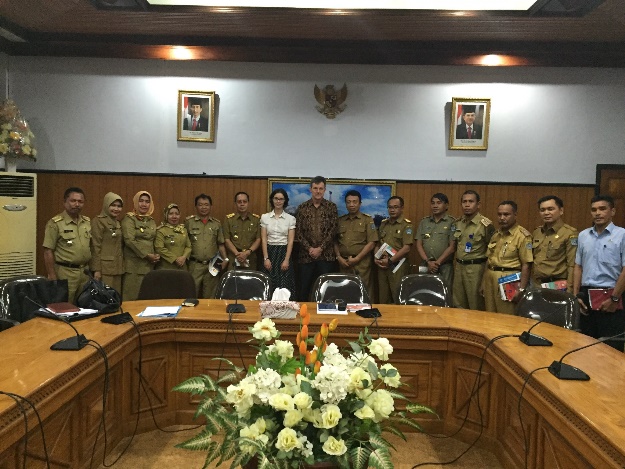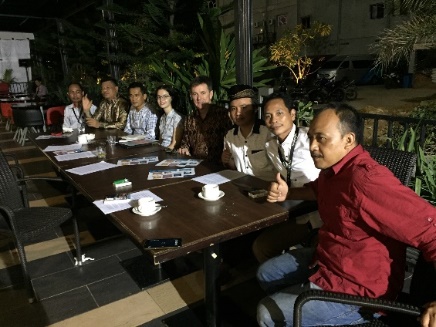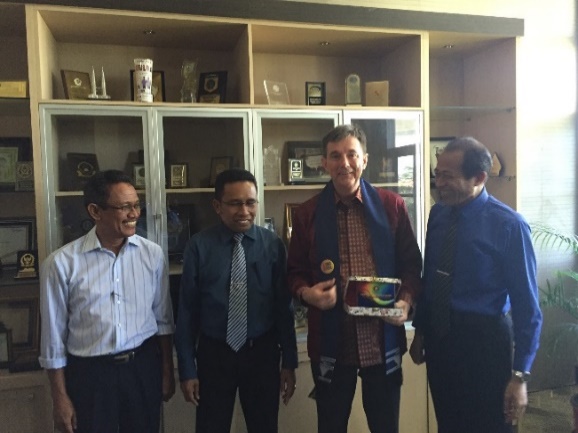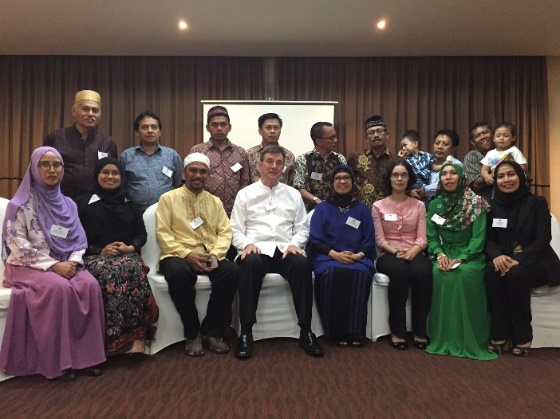In early June we visited Southeast Sulawesi, a province that even for most Indonesians is not very well-known. It has no major city like Makassar: the capital Kendari is a small town of around 320,000 people. When I visited Kendari in 1998 it was like visiting a colonial outpost: the mainly Javanese senior officials in the province were all counting the days until they could get back home. Today the main activities in the province have not changed much and remain agriculture, fishing, some mining (mainly nickel and a little gold), and it is surrounded by numerous beautiful coral islands. The Wakatobi islands, recently designated by President Jokowi as one of Indonesia’s top ten destinations, stretch out southeast into the Flores Sea. Kendari sits around the a large shallow bay of mangrove swamps which is gradually silting up, and slowly rising forested hills encircle the bay.
 Today the senior officials in Southeast Sulawesi are all local, the result of reformasi since the end of the Suharto era, and the flowering of democracy, regional autonomy and local elections. My first meeting in town was with the Vice-Governor of the province, Mohammad Saleh, now into his second elected term. I began talking about our new Consulate-General in Makassar, then started promoting the benefits of an Australian education for the people of Southeast Sulawesi. I pointed out to Pak Saleh and his heads of departments the wide range of scholarships available to Indonesians for overseas university study – the Australian government offers at least 200 Australian Awards scholarships each year, but the Indonesian government offers over 4,000 scholarships annually for overseas study, and international agencies such as the World Bank and the Asian Development Bank offer scholarships as well. Most of these scholarships are very attractive in that they fund all university fees, international travel and a living allowance sufficient for scholars to bring their families. Being the bearer of such good news I received a very friendly reception. These officials all seemed to know someone who had studied in Australia who had had a good experience.
Today the senior officials in Southeast Sulawesi are all local, the result of reformasi since the end of the Suharto era, and the flowering of democracy, regional autonomy and local elections. My first meeting in town was with the Vice-Governor of the province, Mohammad Saleh, now into his second elected term. I began talking about our new Consulate-General in Makassar, then started promoting the benefits of an Australian education for the people of Southeast Sulawesi. I pointed out to Pak Saleh and his heads of departments the wide range of scholarships available to Indonesians for overseas university study – the Australian government offers at least 200 Australian Awards scholarships each year, but the Indonesian government offers over 4,000 scholarships annually for overseas study, and international agencies such as the World Bank and the Asian Development Bank offer scholarships as well. Most of these scholarships are very attractive in that they fund all university fees, international travel and a living allowance sufficient for scholars to bring their families. Being the bearer of such good news I received a very friendly reception. These officials all seemed to know someone who had studied in Australia who had had a good experience.
Likewise in my next meeting at the Mayor of Kendari’s office I emphasised education. I was sat at a table of around 20 officials, including all the city government departmental heads. The Sekda (regional government Secretary) gave a spiel about the city’s ambition to become a “smart city” in the 21st century. For mayors across Indonesia, the “smart city” concept has really taken off (google it – Jakarta, Bandung, Makassar are all onto the idea). My spiel was to tell the Sekda how we could make his citizens “smart” by getting an Australian education.
The officials all sat up and became attentive when I mentioned the short courses that Australia Awards can offer for local government officials. These short courses are highly competitive and open to officials from all over Indonesia. But they are tailored to local needs. For example, a recent offering focuses on Coastal Zone Management in tropical environments: the courses are fully funded and held in Australia over two to three weeks, include pre-departure training as well as post-course follow-up. Really good stuff.
Education is a key part of my job. As a former teacher this is quite pleasing. I loved teaching: I taught Indonesian at high school in Australia and I have also taught English in Indonesia. It is a very rewarding career, especially if you stick to it and see your students graduate and become successful young adults.
Not only do we Australian diplomats in Indonesia promote the benefits of study in Australia – we also support local education where we can, and support our local Australian alumni groups too. In the eastern provinces school infrastructure is improving: dirt floors and grass rooves are being replaced by good concrete and brick buildings with rooves that do not leak. Australia has funded some of those programs, having contributed to the construction of over 3,000 schools over the past ten years. This is an amazing number.
But there are still serious problems of staffing and resources. Lack of books is one aspect. In many schools the only full-time paid teacher might be the principal. All the other teachers may be “honorary teachers”, that is they have not yet been appointed as full-time paid teaching staff because they are still waiting for their accreditation. Often, the local government or the privately funded community Islamic schools (madrassahs) just don’t have the money to pay full-time teachers.
 That evening I hosted a “buka puasa” ie breaking of the fast event, with local Kendari journalists. The main theme was again education. My colleague Anne and I emphasised the benefits and accessibility of an Australian education. Anne also demonstrated a new smartphone game that the Embassy in Jakarta has developed for children that teaches Indonesians about Australia and vice-versa, called Next Door Land. Next day we were on the front page of the Kendari Post talking about education.
That evening I hosted a “buka puasa” ie breaking of the fast event, with local Kendari journalists. The main theme was again education. My colleague Anne and I emphasised the benefits and accessibility of an Australian education. Anne also demonstrated a new smartphone game that the Embassy in Jakarta has developed for children that teaches Indonesians about Australia and vice-versa, called Next Door Land. Next day we were on the front page of the Kendari Post talking about education.
Interestingly print media is still doing well in eastern Indonesia. Reading through the pages of the Kendari Pos and the Rakyat Sultra it is clear that the major advertisers are regional politicians. The elections for Governor of Southeast Sulawesi and Mayor of Kendari are coming up in 2017 and 2018 respectively, and leading prospective candidates are already campaigning, providing good advertising revenue to the local newspapers.
to the local newspapers.
The key events on my second day in Kendari were a lecture I delivered at the local Halu Oleo University, and a buka puasa that I hosted for Australian alumni and their families in Kendari.
The lecture was fun. I delivered a variant on a lecture that I give on Australian-Indonesian relations. I focus on the historical good start we had at the end of WWII when Australia was the lead-supporter among western nations at the UN for Indonesian independence in the face of Dutch attempts to retain control of their former colony. I emphasise the other connections we have, such as the Makassar traders’ links with northern Australia from the early 18th century, and I highlight the strong similarities we share, especially since the beginning of reformasi (post-Suharto democracy era). I argue that we share similar values and objectives and that instead of being the “strangest of neighbours” we should become the “closest of neighbours”.
 Our Australian alumni buka puasa that evening was very enjoyable. Inviting the families along proved to be a winning factor. Some of these alumni have spent up to ten years studying or researching in Australia and some of their children were born down under so share things in common with each other. Bringing the alumni together in this manner enabled them to network and renew old links. They all reminisced fondly of their time in Australia. I encouraged the alumni (around 40 of them in Kendari) to work together to promote Australian courses. All are very keen to do so, and have committed to re-establishing their alumni network. They are all very lovely people, and I wish them the best.
Our Australian alumni buka puasa that evening was very enjoyable. Inviting the families along proved to be a winning factor. Some of these alumni have spent up to ten years studying or researching in Australia and some of their children were born down under so share things in common with each other. Bringing the alumni together in this manner enabled them to network and renew old links. They all reminisced fondly of their time in Australia. I encouraged the alumni (around 40 of them in Kendari) to work together to promote Australian courses. All are very keen to do so, and have committed to re-establishing their alumni network. They are all very lovely people, and I wish them the best.
***
